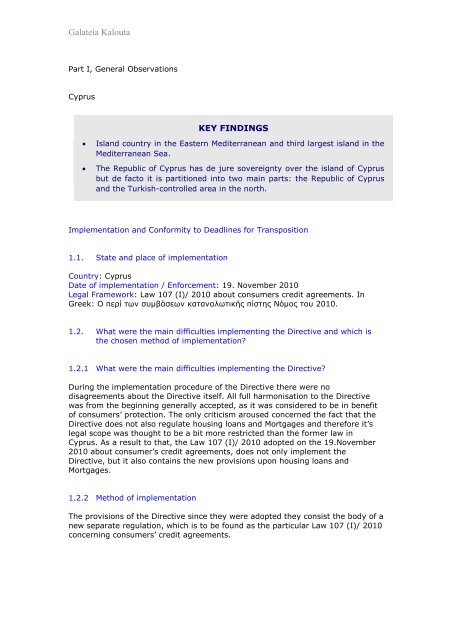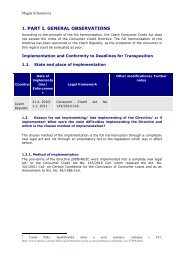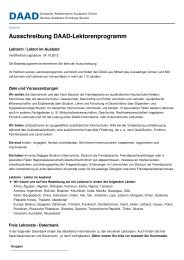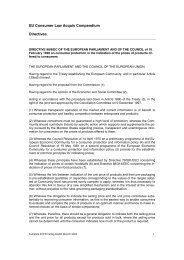Part I, General Observations - Zoll.jura.uni-osnabrueck.de
Part I, General Observations - Zoll.jura.uni-osnabrueck.de
Part I, General Observations - Zoll.jura.uni-osnabrueck.de
- No tags were found...
Create successful ePaper yourself
Turn your PDF publications into a flip-book with our unique Google optimized e-Paper software.
Galateia Kalouta<strong>Part</strong> I, <strong>General</strong> <strong>Observations</strong>CyprusKEY FINDINGSIsland country in the Eastern Mediterranean and third largest island in theMediterranean Sea.The Republic of Cyprus has <strong>de</strong> jure sovereignty over the island of Cyprusbut <strong>de</strong> facto it is partitioned into two main parts: the Republic of Cyprusand the Turkish-controlled area in the north.Implementation and Conformity to Deadlines for Transposition1.1. State and place of implementationCountry: CyprusDate of implementation / Enforcement: 19. November 2010Legal Framework: Law 107 (I)/ 2010 about consumers credit agreements. InGreek: Ο περί των σσμβάσεων καταναλωτικής πίστης Νόμος τοσ 2010.1.2. What were the main difficulties implementing the Directive and which isthe chosen method of implementation?1.2.1 What were the main difficulties implementing the Directive?During the implementation procedure of the Directive there were nodisagreements about the Directive itself. All full harmonisation to the Directivewas from the beginning generally accepted, as it was consi<strong>de</strong>red to be in benefitof consumers’ protection. The only criticism aroused concerned the fact that theDirective does not also regulate housing loans and Mortgages and therefore it’slegal scope was thought to be a bit more restricted than the former law inCyprus. As a result to that, the Law 107 (I)/ 2010 adopted on the 19.November2010 about consumer’s credit agreements, does not only implement theDirective, but it also contains the new provisions upon housing loans andMortgages.1.2.2 Method of implementationThe provisions of the Directive since they were adopted they consist the body of anew separate regulation, which is to be found as the particular Law 107 (I)/ 2010concerning consumers’ credit agreements.
Galateia Kalouta<strong>Part</strong> II, Specific Aspects of Directive 2008/48/EC2.1 Implementation of Specific Aspects of the Directive which changed from the1987 Directive of Consumer Credit2.1.1. Fully harmonised Aspects2.1.1.1. About the duty to provi<strong>de</strong> pre-contractual information to the consumer(Art. 5 and 6 Directive 2008/48/EC)(1) Cyprus has simply incorporated the Standard European Consumer CreditInformation, exactly as it is to be found in Annex II of the Directive.(2) Prior the enforcement of the 2008 Directive, the national regime aboutconsumer’s credit used to be regulated through the Law 39 (I)/2001 andit’s amendments which were Law 166 (I)/2001, Law 34 (I)/2002, Law 77(I)/2002 and Law 33 (I)72004.According to the previous national regime the creditor was not obliged togive pre-contractual information, so that the consumer could comparebetween the different offers and so that he therefore would be able to takean informed <strong>de</strong>cision upon credit agreements.On the other hand the creditor of a home loan was, according to theprevious national regime, obliged to give pre-contractual information, dueto the Commission Recommendation of 1 March 2001 on pre-contractualinformation to be given to consumers by len<strong>de</strong>rs offering home loans(2001/193/EC). Because of the Commission’s Recommendation mentionedabove, the Standard European Consumer Credit Information had beencreated, which the Banks in Cyprus subsequently adopted and thereforeprovi<strong>de</strong>d to their customers, but only in cases of home loans.In other words, SECCI was already known in Cyprus as it was alsopreviously in use but only especially for home loans (according to theCommission Recommendation 2001/193/EC). Since the enforcement ofthe Directive 2008/48/EC the scope of SECCI has been substantiallyexpan<strong>de</strong>d, in or<strong>de</strong>r to cover other kind of credits also.(3) An opposition towards SECCI before or even after the implementation ofthe Directive has not really been documented. The Association of CyprianBanks had only commented, before its implementation, that its membersalready fulfilled their obligations in accordance to the CommissionRecommendation 2001/193/EC, as they provi<strong>de</strong>d their customers with it incase of home loans.2.1.1.2. Contractual information to be written into the credit agreement, article10, 2008/48/EC.Art. 10 of the Directive 2008/48/EC, has been implemented in the Cyprianlegislation as it is. In comparison to the previous law, it extends the possibilitiesof data carriers, which may be appropriate for a credit agreement. As per theprevious law, valid credit agreements had to be written only on paper (Art. 8 aLaw 39 (I) 2001). A copy or an original of the credit agreement had to be han<strong>de</strong>dpersonally to the consumer during the conclusion of the agreement or it should
Galateia Kaloutabe sent to him as registered within 10 days since the conclusion of the agreement(Art. 8 c i and ii).On the other hand, Art. 10, 2008/48/EC is much more <strong>de</strong>tailed and therefore itcan only be consi<strong>de</strong>red as a gain for the Cyprian legislation, as the provisions ofthe previous Law concerning the form of the credit agreement were neither thatexplicit nor that particular as Art. 10, 2008/48/EC is.2.1.1.3. Right of withdrawal for the consumer until 14 days after the conclusion ofthe credit agreement, article 14, 2008/48/EC.Once again the Directive regulates a more consumer friendly provision, asaccording to the previous Law (Art. 8 d Law 39 (I) 2001), the right of withdrawalhad to be exercised within a smaller time period, namely within 10 days since thecustomer had received either a copy or the credit agreement itself in original.But the customer due to another separate agreement he had agreed upon, coul<strong>de</strong>xpress beforehand his wish of not making use of his right of withdrawal. Thatmeans that afterwards he would not be able to change his mind and make use ofsuch a right.2.1.1.4. Conditions of early repayment, article 16, 2008/48/EC.Art. 16, Cyprian Law 107 (I)/ 2010 of consumer’s credit agreements correspondsword by word to Art. 16, 2008/48/EC.As per the previous legislative Act, the consumer was again entitled to dischargehis obligations at a prior point therefore he should hand in a writtenannouncement to the creditor notifying his intention to resign from the creditagreement. He was moreover entitled to a reduction in the total cost of thecredit, from which reduction an amount of 5-10% would be then <strong>de</strong>ducted foradministrative costs (Art. 23 Law 39 (I) 2001).The exceptions to the compensation obligation in case of an early repayment asprovi<strong>de</strong>d in Art. 16 par. 3 lit. a-c Directive 2008/48/EC, about the frame of thecompensation that can be claimed, are provisions that were not at all foreseen inthe previous law and therefore its enforcement certainly raises the level ofconsumer protection. The previous Law expected solely that the compensationimplemented by the Court had to be a<strong>de</strong>quate (Art. 26 Law 39 (I) 2001).2.1.1.5. Calculation method for the Annual Percentage Rate of Charge (APR),article 19, 2008/48/EC.The basic mathematical equation in or<strong>de</strong>r to calculate the annual percentage rateof charges according to the previous law, as it is shown in its Annex II, used to bethe following:K =mK‘ =m‘Σ Aκ/(1+ i) tk = Σ A’κ’/(1+ i) tk \K═1K‘═1Art. 19, par. 2 of the Directive and, therefore, also Art. 19 par. 2 of the new Lawconform completely with the content of Art. 1 par. a and b in Annex IV of theprevious legislative act, which means that any charges due to non-compliance of
Galateia Kaloutathe consumer to his commitments based on the credit agreement, as well ascharges, other than the purchase price, for purchases of goods or services werealso according to the previous law being exempted from the calculation process ofthe annual percentage charge rate.Compliant with par. 1 lit. c in Annex IV of Law 39 (I) 2001, the costs ofmaintaining an account recording payment transactions and drawdownconcerning the credit payments, as well as other costs relating to paymenttransactions were also exempted from the calculation of the annual percentagecharge rate, unless these charges were to be extremely high.Otherwise, par. 4 and 5 of the new Law of 2010 (which also means par. 4 and 5of the Directive) correspond thoroughly to par. 2 lit. a (i), lit. b and par. 3 inAnnex IV of the previously applied law.As far the calculation method for the APR is concerned, the article 19,2008/48/EC does not seem to have brought any great changes to what it wasalso previously though Law 39 (I) 2001 been <strong>de</strong>ployed.2.1.2. Implementation of “options” provi<strong>de</strong>d in Artt. 5 para. 6 sent. 2, 15 para. 2sent. 2 and Art. 23 of Directive 2008/48/EC.2.1.2.1/ Art. 5 par. 6 sent. 1 and 2, Directive 2008/48/EC.In Art. 5 par. 6 of the new Law upon consumer credits agreements it is statedthat in case of comm<strong>uni</strong>cation through telephone the following should be at least<strong>de</strong>finitely mentioned:- The total amount of credit and the conditions governing the drawdown (orelse what’s stated in Art. 5, par. 1 lit. c, Directive 2008/48/EC),- the duration of the drawdown (also found in Art. 5 Par. 1 lit. d, Directive2008/48/EC),- in case of a credit in the form of <strong>de</strong>ferred payment for a specific good orservice and linked credit agreements, that good or service and its cashprice (Art. 5 Par. 1 lit. e, Directive 2008/48/EC),- the borrowing rate, the conditions governing the application of theborrowing rate and, where available, any in<strong>de</strong>x or reference rateapplicable to the initial borrowing rate, as well as periods, conditions andprocedure for changing the borrowing rate, if different borrowing ratesapply in different circumstances, the above mentioned information on allthe applicable rates (Art. 5 Par. 1 lit. f, Directive 2008/48/EC) and- the amount number and frequency of payments to be ma<strong>de</strong> by theconsumer and, where appropriate, the or<strong>de</strong>r in which payments will beallocated to different outstanding balances charged at different borrowingrates for the purposes of reimbursement (namely Art. 5 par. 1 lit. h,Directive 2008/48/EC).Also, the ARP followed by an explanatory and representative example as well asthe total amount that the consumer will have to pay.
Galateia Kalouta2.1.2.2. Art. 15 par. 2 sent. 2, Directive 2008/48/EC.The extent and conditions un<strong>de</strong>r which the remedies, in sense of Art. 15 par. 2sent. 1, are to be exercisable in Cyprus is being <strong>de</strong>termined in Art. 15 par. 3 ofthe Law 107 (I)/2010 , upon consumer credit agreements. Un<strong>de</strong>r the terms ofthis article, the consumer shall have the right to pursue remedies against thecreditor only if he has previously tried to satisfy his claim before court and hasfailed to be satisfied by his creditor, either entirely or only partially.2.1.2.3. Art. 23, Directive 2008/48/EC.Penalties, in sense of Art. 23 of the Directive 2008/48/EC, are being explicitly laiddown in Art. 22 and 23 of the new Law 107 (I)/2010 on consumer creditagreements. The Authority responsible for the appliance of competition-law, aswell as for consumer protection, which is located within the Ministry of Tra<strong>de</strong>,Industry and Tourism, is therefore, after the examination of a complaint or as aresult of an ex officio investigation, entitled to impose either one or more of thefollowing administrative penalties and fines:(a) The Authority can either <strong>de</strong>mand or recommend to the violator, that hewithin a certain period of time must end the violation and also must avoidany kind of recurrence of the violation in the future. In case that theviolation has been stopped before the release of the Authority’s verdictupon the matter, the violation must be nevertheless stated in the verdict.(b) The Authority can furthermore either <strong>de</strong>mand or recommend the violatorto take certain measures, which, un<strong>de</strong>r the opinion of the Authority, maylead to a recovery of the illicit situation that the violation has caused.(c) The Authority can issue a fine, in accordance to the nature, gravity andduration of the violation, which may reach the percentage of 5% of workcircle of the violator, but it is not allowed un<strong>de</strong>r any circumstances toexceed the amount of 500.000 Euros, during the year within the violationhas occurred or in the year exactly after the violation year.(d) In case of continuation of violation, a fine up to 1.700 Euros per day canbe or<strong>de</strong>red, <strong>de</strong>pending on the gravity of violation and/or(e) To indict before Court any person, who according to the opinion of theAuthority, is responsible for the violation, un<strong>de</strong>r the conditions regulated inArt. 25, Law of 2010.The Authority is obligated to explain its <strong>de</strong>cisions and has also the duty tosummon the violator, so that he or his mandate will be heard orally or in writtenform before issuing of the verdict.The verdict issuing a fine can be within 30 days, since the announcement of theAuthority’s <strong>de</strong>cision, appealed before the Minister of Tra<strong>de</strong>, Industry and Tourism.When the <strong>de</strong>adline to appeal before the Supreme Court, according to Art. 146 ofthe Constitution, inactively expires, the Authority is entitled to collect the fine.If a fine or<strong>de</strong>red by the Authority has not been paid, the Authority can indict theliable party to the civil courts and then the amount will be collected in form of acivil <strong>de</strong>pt towards the Republic of Cyprus.
Galateia Kalouta2.1.3 Implementation of other “options”.2.1.3.1. Art. 2 par. 5 and 6, Directive 2008/48/EC.Cyprus has taken fully the option regulated in Art. 2 par. 5 and 6 as it is stated inArt. 2 par. 4 (lit. a+b), par. 5 and par. 6 of the new Law 107 (I)/2010 onconsumer credit agreements. The regulation in the Cyprian legislative actconforms completely with the provision in the Directive.2.1.3.2. Art. 4 par. 2 lit. c (Directive 2008/48/EC).Art. 4 par. 2 lit. c, as well as Art. 4 par. 3 of the Directive 2008/48.EC are body ofthe Cyprian legislature, since Art. 4 par. 3 and par. 4 of the Law 107 (I)/2010upon consumer credit agreements is in force. The regulation in the Cyprianlegislative act conforms fully to the provision of the Directive.2.1.3.3. Art. 6 par. 2 (Directive 2008/48/EC).In Cyprus, the option, provi<strong>de</strong>d in Art. 6 par. 2 (Directive 2008/48/EC), was nottaken (according to Art. 6, par. 6 lit. b and Art. 3 par. 2, of the new Law 107(I)/2010).2.1.3.4. Art. 10 par. 5 lit. f (Directive 2008/48/EC).Cyprus has adopted the option, according to which the annual percentage ratehas to be provi<strong>de</strong>d in case of a credit agreement in the form of overdraft facilities.So is stated in Art. 10 par. 7 lit. f of the recent Law 107 (I)/2010 on consumercredit agreements.2.1.3.5. Art. 14 par. 2 and 6 (Directive 2008/48/EC).Cyprus has not accepted the options <strong>de</strong>noted in Art. 14 par. 2, nor that of par. 6of the Directive.2.1.3.6. Art. 15 par. 2 sent. 2 (Directive 2008/48/EC).Cyprus has adopted the option of Art. 15 par. 2 of the Directive, about remediesthat the consumer can pursue against the creditor, in case of goods or servicescovered by a linked credit agreement, which were either not been supplied, orwere supplied only in part, or the supply was not in conformity with the contract.In Art. 15 par. 3 of the new Law concerning consumer credit agreements (2010),has been regulated the extent and the conditions of such remedies. According towhich the consumers’ right against the creditor can only then be exercised, if theconsumer has previously already brought up his claim against the provi<strong>de</strong>r beforeCourt and has failed either entirely or only partially to be satisfied by his provi<strong>de</strong>r.2.1.3.7. Art. 16 par. 4 (Directive 2008/48/EC).Cyprus has accepted the option given in Art. 16 par. 4 of the Directive. In accordto Art. 16 par. 5 lit a (i) the compensation <strong>de</strong>man<strong>de</strong>d from the creditor can beclaimed on the condition that the amount of the early repayment is at least10.000 Euros within any period of 12 months.Furthermore, Art. 16 par. 4 b of the Directive corresponds fully to Art. 16 par. 5lit. a (ii), b und c, of the recent Law about consumer credit agreements (2010).
Galateia Kalouta2.1.4. Implementation of selected “new” regulations.2.1.4.1. Advertising requirements, Art. 4(1)Art. 4 par. 1 of the new Law 107 (I)/2010, concerning standard information thathas to be inclu<strong>de</strong>d in advertising, refers on the one hand to the national Lawabout illicit tra<strong>de</strong> practices un<strong>de</strong>rtaken by companies against consumers and onthe other hand to Art. 4 par. 2, of the recent Law 107 (I)/2010, about consumercredit agreements.In Art. 4 par. 2, of the new Law (2010) stands, that the provisions of Art. 4 of thenew Law 107 (I)/2010 are not be applied in case of advertising consumer creditagreements, when the annual percentage rate of charge is being <strong>de</strong>picted in sucha way, that neither the interest rate nor any figures relating to any credit costsare being mentioned.(2)The APR has to be specified also for overdraft facilities, in compliance with Art. 6par. 6 and par. 2 lit. f, of the new Law 107 (I)/2010 on consumer creditagreements.2.1.4.2. Art. 19 of the Directive; Fixed calculation method for the APR.Art. 19 Nr. 1 of the Directive accords to Art. 19 par. 1 of the new Law 107(I)/2010.Art. 19 Nr. 2 par. 1 of the Directive is embodied in the Cyprian legislature throughArt. 19 par. 2 of the recent Law107 (I)/2010.Art. 19 Nr. 2 par.3 of the Directive corresponds fully to Art. 19 par. 3 (Law 107(I)/2010).Art. 19 Nr. 3 of the Directive is Art. 19 par. 4 (Law 107 (I)/2010).Art. 19 Nr. 4 of the Directive is in Cyprus Art. 19 par. 5 (Law 107 (I)/2010).Art. 19 Nr. 5 of the Directive is Art. 19 par. 6 (Law 107 (I)/2010).2.1.4.3. Art. 8 2008/48/EC; CreditworthinessAccording to Art. 8 par. 1 of the new Law (107 (I)/2010), the creditor before theconclusion of any kind of credit assesses the consumer’s creditworthiness on thebasis of the sufficient information provi<strong>de</strong>d from the consumer himself and whennee<strong>de</strong>d, also on the basis of a consultation of a relevant database, which legallyoperates within the Republic of Cyprus. Such an assessment can be permittedonly un<strong>de</strong>r reserve of the Law concerning misuse of personal data and dataprotection.Moreover, in Art. 8 par 2 of the recent Law (2010), it is stated that if the partiesagree to change the total amount of the credit after the conclusion of the creditagreement, the creditor updates the financial information at his disposalconcerning the consumer and assesses the consumer’s creditworthiness before
Galateia Kaloutaany significant increase in the total amount of the credit (exactly as in Art. 8 par2 2008/48/EC).2.1.5. Implementation of aspects requiring interpretationNo problems were related to the transposition of Art. 5 par. 1 and 6 or Art. 8 par.1.2.1.5.1. Art. 5 par. 1; “in good time”.Art. 5 par. 1 sent. 1 of the Directive corresponds exactly to Art. 5 par. 1 of thenew Law107 (I)/2010. “In good time” has been transposed in Cyprus with theequivalent phrase in Greek.2.1.5.2. Art. 5 par. 6; “in a<strong>de</strong>quate explanations”In Art. 5 par. 10 of the recent Law it is stated that creditors and, whereapplicable, credit intermediaries provi<strong>de</strong> a<strong>de</strong>quate explanations to the consumer,so that the consumer will be able to assess if the proposed credit agreement isadapted to his needs and to his financial situation.Moreover, because of Art. 5 par. 11 of the new Law, 107 (I)/2010, the followinghas been converted into Cyprian Law; The creditor and, where applicable, creditintermediaries, where appropriate, must;(a) explain the pre-contractual information in accordance to par. 4 and 5 and(b) point out the essential characteristics and the specific effects they mayhave on the consumer, including the consequences of <strong>de</strong>fault in paymentby consumer.In other words, Art. 5 par. 10 and 11 of the Cyprian Law is in entire accordanceto Art. 5 par. 6 of the Directive. The “a<strong>de</strong>quate explanations” nee<strong>de</strong>d are notbeing further elucidated within this legislative act 107 (I)/2010. The phrase hasbeen solely translated into the equivalent phrase in Greek.2.1.5.3. Art. 8 par. 1; “sufficient information”.The sufficient information has to be provi<strong>de</strong>d from the consumer himself or, whennee<strong>de</strong>d, they may occur after a survey through a relevant database, whichoperates legally within the Republic of Cyprus. This “sufficient information” mustcomply with the provisions of the Law about misuse of personal data and datasecurity (Art. 8 par. 1 of the Cyprian Law).2.1.6. Regulated Aspects which fall outsi<strong>de</strong> the scope of the Directive as <strong>de</strong>finedin Art. 2 of the Directive.2.1.6.1. Has the scope of the implementing legislation been exten<strong>de</strong>d beyondthat of the Directive?Yes, it also concerns Land Mortgages up to the amount of 35.000 EUR.





